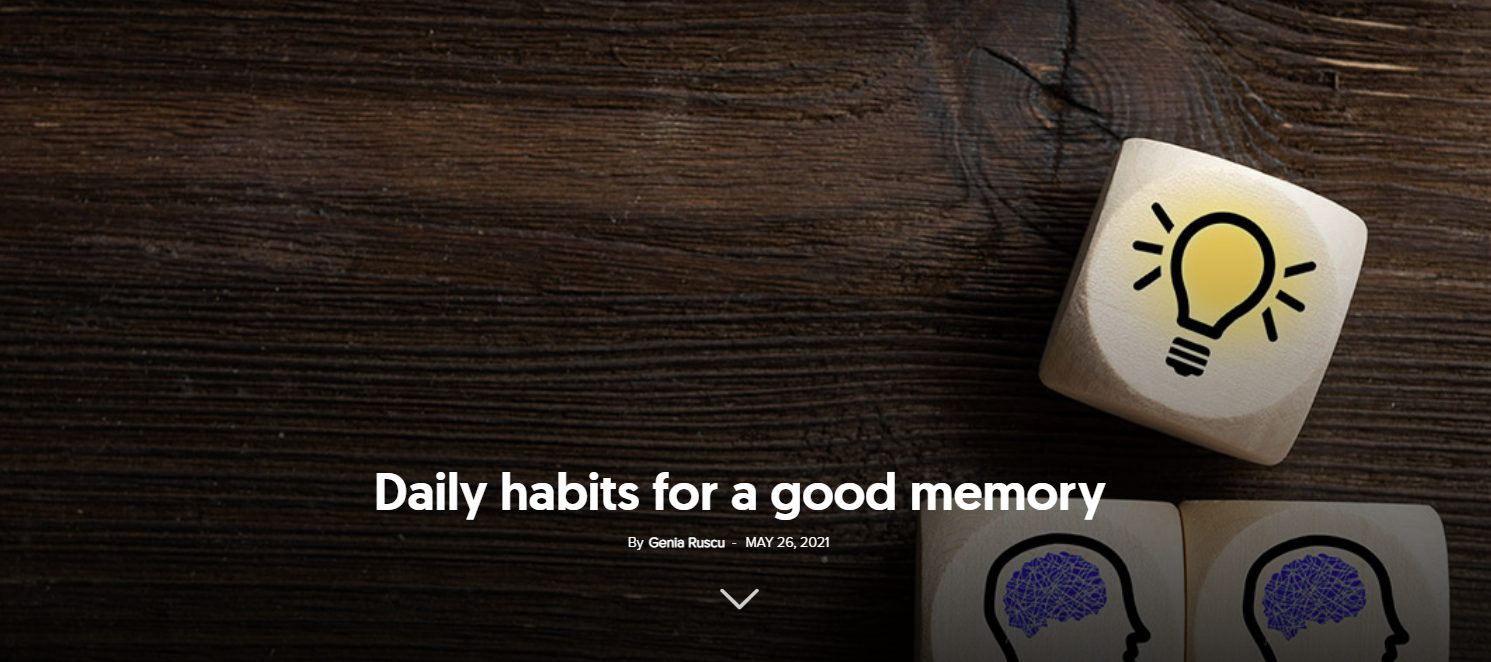Memory training is often the only difference between people with impressive memorization skills and those with average memory, researchers suggest. However, the long-term results intersect with a healthy life and learning style.
The brain of a person with average memory is not structurally different from that of a person who stores an impressive amount of information, the only difference being the connectivity of the brain (the regions in the brain of those who have a super-memory work together in different ways). This was the conclusion of a small study led by neuroscientist Martin Dresler in 2017, which found that using mnemonic techniques can effect changes in the brain connections of ordinary subjects.
In the study, 23 participants trained their memory 30 minutes a day, managing to double the number of memorised data in only 40 days. Four months away from the end of the training, the performance of the volunteers was still maintained.
In a different context and for different reasons, journalist Joshua Foer set out to see if training could turn him from a person with a not-so-great memory into a memory titan, and the results exceeded his wildest expectations.
When memory training is part of an experiment gone haywire
Foer’s adventure began when he set out to write an article about “memory athletes,” observing how the United States Memory Championship was played. It was 2005, the championship was being held on the 19th floor of a Manhattan building, and Foer was scrutinising with the greatest interest all these unusual people, who managed to memorise long lists of numbers, names, and faces of strangers or pages of unpublished poems in just a few minutes.
These are people with average memory, Ed Cooke told him at the time. Cooke was a contestant from England who knew huge chunks of Paradise Lost by heart and whom Foer saw recite a list of 252 random numbers. To prove to him that all this ability to retain a large volume of information was acquired through practice, Cooke offered to become his coach for the next few months.
Therefore, for a year, Foer memorised lists of unknown numbers or names every morning for 10-15 minutes, repeating this training during subway trips. Even walks around the neighbourhood became opportunities to memorise car registration numbers.
Throughout this training, the journalist often turned to specialised literature to discover solutions to the difficulties he faced, and was monitored by a psychology professor.
After a while, upon periodic testings, Foer began to obtain scores resembling those of the winners of the United States Memory Championship. Cooke warned him that his training was quite light and that, in a competition, the results would be at least 20% lower than what he got at home. However, in the spring of 2006, Foer went on to win the championship, even managing to set a new national record in one of the events.
Memory training through a method as old as it is effective
One of the basic techniques used by Foer was to store information in a “memory palace.” This was a common technique in ancient Greece, which orators used in order to remember the ideas of their speeches. The central elements of this technique are the storage of information in the form of images and the use of spatial memory to place the images in a familiar space.
The story goes that the technique was discovered by the poet Simonides of Ceos. Called to entertain a group of wealthy noble people, at one point Simonides left the banquet hall rather abruptly. Only a few moments later, the roof of the building collapsed, crushing guests and hosts alike. Asked to identify the corpses, Simonides closed his eyes and was able to reconstruct the scene of the banquet in his mind, realising that he could point to where each participant sat.
Anastasia Woolmer, author of a program for mnemonic technique learning, and double winner of the Australian Memorization Championship, says that she builds a memory palace for each new group of information. She has thousands of such spaces, some imaginary, some real.
Woolmer says she sometimes uses this technique in order to help her daughter study for tests at school. For example, on one occasion, Sherley, her daughter, had to memorize the social structure of Egyptian society, and Woolmer helped her memorize the entire list (from pharaoh and viziers to peasants and slaves) by placing the characters in different corners of their house.
They imagined the pharaoh knocking hard on the door, and in order for the image to be better engraved in the memory, they added other details: the pharaoh was wearing a heavy gold mask, the shine of which contrasted with the dusty threshold of the door.
Moreover, because the sound of the word vizier reminded Shirley of a vase, they imagined in the hall, above the front door, two vases with an eye painted on them, each eye looking anxiously towards the door. In order to remember the nobility, they turned their attention to the sofa in the living room, where they crammed in their imagination several clones of Mrs. Noble, one of Shirley’s teachers. The game continued until each word on the list was associated with an unforgettable image.
This is the very idea behind the “memory palace” technique—to populate an imaginary or real building with the most bizarre, memorable, or funny images, so that the memory easily remembers them, psychologist Ryan Anderson says.
Do mnemonic techniques have real effects?
Studying 35 people participating in memory competitions, neuroscientist Martin Dresler found that all of them claimed to have ordinary memory and that it was the training that helped them achieve surprising results. They also identified, without exception, the “memory palace” method as the most important strategy to expand their memory capacity.
This technique can even work for the elderly, improving their ability to memorise, some studies have shown. There are also researchers who even hope that the technique could be used in patients suffering from Alzheimer’s, helping them remember the faces of their loved ones, and that a combination of mnemonic techniques, training of other cognitive areas (such as logic or attention) and drugs against dementia could slow down memory loss.
After exploring how training one’s working memory can contribute to cognitive development in children and adults, researcher Monica Melby-Lervåg says that no solid evidence has been found that this type of training has a significant impact on general memory. The benefits appear to be limited when it comes to transferring the results obtained through these memorization strategies to tasks that are relevant to everyday life. This means that, beyond the use of shortcuts, we need verified elements of a learning style (also of a lifestyle) that consolidate the performances obtained in the short term.
Memory training and breaks that help consolidate information in long-term memory
We tend to overload the brain when we have to store a large amount of information in a small amount of time, but studies show that we should not underestimate the role of breaks.
One of the many experiments conducted by the German psychologist Georg Elias Muller at the beginning of the last century showed that information patterns of recall were better when there were breaks in learning. A group of volunteers was given the task of learning a list of meaningless syllables, after which the group was divided in two—half of the group immediately received the next list to be memorised, while the other half had a 6-minute break before moving on. Surprisingly, when tested half an hour later, the volunteers in the subgroup who benefited from the break recalled almost 50% of their list, while the subjects in the other group managed to reproduce only 28% of memorised syllables.
In the early 2000s, researchers Sergio Della Sala and Nelson Cowan tried to find out if breaks inserted into the learning process could improve the memory of people who had suffered a neurological injury. Subjects received lists of 15 words and were tested without any breaks in the first stage of the experiment and, again, during a second stage, after being allowed to rest in a dark room.
With the exception of two patients who suffered from severe amnesia and for whom the break had no benefit, the others tripled the number of words they remembered (from 14% to 49%) when the break preceded testing. The surprising conclusion of the researchers was that learning breaks place the results of people with neurological damage very close to the results of healthy people.
When and how should we repeat?
Repeating material until it is memorised is a well-known method that pays off, but studies show that there are much more effective strategies to retain information, such as elaborative repetition, in which efforts are made to understand the meaning of new information.
In one of the studies demonstrating the effectiveness of elaborative repetition, researchers asked participants to check whether a word contained a certain letter and then think about the meaning of the word. Only half of the subjects were informed that they would perform a memory test later, the others being convinced that the test consisted of checking the letters of certain words. The conclusion of the study was that the intention to memorise was less important in improving memory than the way of processing information.
Reviewing learned information at optimal intervals is very important for remembering it. This was the conclusion of the German psychologist Hermann Ebbinghaus, who tested how we recall information by memorising lists of random strings of syllables for a decade and a half. The best time to review learned material is right before you forget it, the psychologist found, noting that the intervals at which we should review what we have learned grow exponentially—from a few seconds to a few minutes, from an hour to a day, from a week to a month, three months, a year, etc.
The “forgetting curve” explains why after a month we forget the material learned intensively in the week before the exam, if we skip the process of repeating the information once the exam has passed, Ed Cooke says.
Sleep, a surefire way to improve memory
Learning is an energetically expensive process, says Giulio Tononi, professor of sleep medicine at the University of Wisconsin-Madison. He explains that sleep is essential because it allows the brain to normalise synapse activity after a day of being saturated with information.
The new information we learn during the day is temporarily stored in the hippocampus, which has a limited storage capacity, but during sleep the synapses shrink, allowing for unimportant memories to be eliminated in order to make room for others.
Studies suggest sleep is involved in the process of memorization in two distinct ways. First, sleep deprivation comes with poor concentration, thus reducing effective learning. Second, sleep plays a significant role in memory consolidation (the process by which our brain transfers memories from the hippocampus to the neocortex, where they are stored for a longer period of time).
A report published in 2017 by the Global Council on Brain Health recommends 7-8 hours of sleep per night in order to maintain brain health, even in the elderly. The report also highlights the fact that a regular sleep schedule, regular exposure to sunlight, and physical activity contribute to increasing sleep quality.
Physical exercise strengthens memory
Physical activity plays a key role in improving memory, according to studies that have analysed how movement and memory interact, including in seniors.
A single session of moderate- or high-intensity aerobic exercise boosts learning, memory, attention, and focus in young adults, with effects lasting 30-120 minutes after exercise, as shown by a systematic review published in August 2020.
A 15-minute session of intense cycling improves memory and helps acquire new motor skills, neurologists from the University of Geneva found.
A study of middle-aged women who presented early signs of memory loss showed that a regular aerobic exercise program increased the size of the hippocampus and improved the participants’ verbal memory.
Not all physical exercises are equally effective in preventing dementia, says Teresa Liu-Ambrose, a professor in the Department of Physical Therapy at the University of British Columbia. She came to this conclusion following a study she conducted in 2012, which revealed surprising effects of weight exercise in women with signs of early dementia: not only did their memory improve, but so did their brain’s executive functions (including problem solving and decision making). “Even if you are beginning to see signs of cognitive impairment, the brain is still capable of rebounding with the right kind of physical activity,” says Liu-Ambrose, noting that minimising the rate of cognitive decline can also be achieved with a weight training session or two per week.
Memory training and the memorable life we dream of
Our ancestors trained their memory so that it became a “living concordance,” encompassing all things heard or read and considered of great value, historian Mary Carruthers says—a natural concern, seeing that, until the 14th century, a text had only a few copies, so someone in possession of such a copy knew how improbable it would be to come across that text a second time.
We live today in the midst of a dizzying avalanche of books—hundreds of thousands published annually. The advent of the Internet has further diluted the concentration we need to browse information, because we have “an external hard drive for our memories.” Despite the many benefits that this friend who delivers information at a simple command may bring us, there are also numerous dangers that appear at the intersection between the Internet and human memory.
Studies show that the use of the Internet seems to have created a generation more confident in its knowledge than ever before. The result is that people cement their opinions, even unfounded ones, about politics or science, reaching questionable decisions (financially, medically, and more) and tend to know less, not more, about what’s going on around them.
Memory can be altered by digital devices, a 2019 study found, concluding that people who use GPS apps tend to have poorer spatial memory.
Frequent Internet use can change the way the human brain works, according to a study published by a team of researchers in 2019. The researchers noticed that people who use the Internet intensely score worse on memory tests and are more easily distracted. The unlimited access to information offered by the Internet divides our attention, weakens our ability to focus on a single task and, finally, changes the way our brain stores information, says researcher Joseph Firth, the coordinator of the study.
How we choose to preserve our memory ultimately has to do with the expectations we have of the already short life left for us to live. How much of this life are we willing to waste in front of the screens? This is a question asked by Joshua Foer, who concludes that life is, in the end, the sum of the memories we have. Therefore, his recipe for a memorable life is to learn to be “the person who remembers to remember.”
Carmen Lăiu is an editor at Signs of the Times Romania and ST Network.




















